The central bank would continue communicating with the US to avoid being labeled a currency manipulator next month when the US Department of the Treasury renews its list, the bank said on Thursday.
Taiwan would likely remain on the watch list without being named a currency manipulator, even though it has met the three criteria: having a trade surplus of more than US$20 billion, a current account surplus exceeding 2 percent of GDP and intervention operations surpassing 2 percent of GDP, central bank Governor Yang Chin-long (楊金龍) said.
The US said in an April report that Taiwan, Vietnam and Switzerland met the criteria, but there was not sufficient evidence to link the results to outright manipulation.

Photo: CNA
The US understood that the COVID-19 pandemic and major central banks’ money-printing programs helped account for the imbalances, Yang said.
Taiwan would continue to argue that the criteria are not suitable measures as long as the pandemic lingers and loose monetary policies prevail, which are driving up demand for electronics and the New Taiwan dollar, he said.
Strong exports inflate Taiwan’s current account and propel hot money to the local exchange market, Yang said.
The central bank has no choice but to step in and slow the effect of capital influxes on the local currency, Yang said, adding that a strong NT dollar would erode corporate profitability.
“Taiwan’s interest sits on top of our concern list,” he said.
One way to address trade imbalances is for Taiwan to stop selling chips, but the US and the world need them, Yang added.

The US dollar was trading at NT$29.7 at 10am today on the Taipei Foreign Exchange, as the New Taiwan dollar gained NT$1.364 from the previous close last week. The NT dollar continued to rise today, after surging 3.07 percent on Friday. After opening at NT$30.91, the NT dollar gained more than NT$1 in just 15 minutes, briefly passing the NT$30 mark. Before the US Department of the Treasury's semi-annual currency report came out, expectations that the NT dollar would keep rising were already building. The NT dollar on Friday closed at NT$31.064, up by NT$0.953 — a 3.07 percent single-day gain. Today,

‘SHORT TERM’: The local currency would likely remain strong in the near term, driven by anticipated US trade pressure, capital inflows and expectations of a US Fed rate cut The US dollar is expected to fall below NT$30 in the near term, as traders anticipate increased pressure from Washington for Taiwan to allow the New Taiwan dollar to appreciate, Cathay United Bank (國泰世華銀行) chief economist Lin Chi-chao (林啟超) said. Following a sharp drop in the greenback against the NT dollar on Friday, Lin told the Central News Agency that the local currency is likely to remain strong in the short term, driven in part by market psychology surrounding anticipated US policy pressure. On Friday, the US dollar fell NT$0.953, or 3.07 percent, closing at NT$31.064 — its lowest level since Jan.

The New Taiwan dollar and Taiwanese stocks surged on signs that trade tensions between the world’s top two economies might start easing and as US tech earnings boosted the outlook of the nation’s semiconductor exports. The NT dollar strengthened as much as 3.8 percent versus the US dollar to 30.815, the biggest intraday gain since January 2011, closing at NT$31.064. The benchmark TAIEX jumped 2.73 percent to outperform the region’s equity gauges. Outlook for global trade improved after China said it is assessing possible trade talks with the US, providing a boost for the nation’s currency and shares. As the NT dollar

The Financial Supervisory Commission (FSC) yesterday met with some of the nation’s largest insurance companies as a skyrocketing New Taiwan dollar piles pressure on their hundreds of billions of dollars in US bond investments. The commission has asked some life insurance firms, among the biggest Asian holders of US debt, to discuss how the rapidly strengthening NT dollar has impacted their operations, people familiar with the matter said. The meeting took place as the NT dollar jumped as much as 5 percent yesterday, its biggest intraday gain in more than three decades. The local currency surged as exporters rushed to